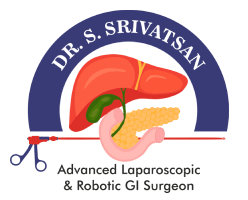
- 11/07/2024
- Dr. Srivatsan Gurumurthy
- 0 Comments
- Blog
How to Manage Liver Disease with Intermittent Fasting
Are you struggling with managing liver disease? Looking for the best approaches to managing liver diseases? then you’re at the right place. Dr Srivatsan Gurumurthy at GEM Hospital Chennai shares the benefits of intermittent fasting. Liver disease, encompassing a range of conditions like fatty liver, cirrhosis, and hepatitis, poses a significant health challenge globally. Effective management is crucial to mitigate its progression and improve quality of life. One emerging strategy is intermittent fasting (IF), a dietary pattern involving cycles of eating and fasting. Dr. Srivatsan Gurumurthy, a renowned specialist in liver disease treatment and liver transplant surgery in Chennai, sheds light on how intermittent fasting can be an effective tool in managing liver disease.
What is Liver Disease?
The liver is a vital organ responsible for numerous functions, including detoxification, protein synthesis, and the production of biochemicals necessary for digestion. Liver disease can disrupt these functions, leading to serious health problems. Common types of liver disease include:
- Non-Alcoholic Fatty Liver Disease (NAFLD): Accumulation of fat in the liver not related to alcohol consumption.
- Alcoholic Liver Disease: Liver damage caused by excessive alcohol intake.
- Hepatitis: Inflammation of the liver, often induced by viral infections.
- Cirrhosis: Severe scarring of the liver tissue, often resulting from prolonged liver damage.
- Liver Cancer: Malignant tumors in the liver.
What is Intermittent Fasting?
Intermittent fasting is not about what you eat, but when you eat. It includes alternating periods of eating and fasting. The most common methods include:
- 16/8 Method: Fasting for 16 hours and eating during an 8-hour window.
- 5:2 Diet: Eating normally for five days and reducing calorie intake to 500-600 calories on two non-consecutive days.
- Eat-Stop-Eat: Fasting for 24 hours once or twice a week.
- Alternate-Day Fasting: Rotating between days of normal eating and fasting.
Benefits of Intermittent Fasting for Liver Disease:
Dr. Srivatsan Gurumurthy explains the benefits of Intermittent Fasting for Liver Disease:
- Reduces Liver Fat: Intermittent fasting helps reduce liver fat, a crucial benefit for individuals with NAFLD. Fasting periods encourage the body to use stored fat for energy, reducing fat accumulation in the liver.
- Improves Insulin Sensitivity: Improved insulin sensitivity is another significant benefit. Reduced insulin resistance helps in better glucose regulation, which is essential for preventing and managing type 2 diabetes, a common comorbidity in liver disease patients.
- Promotes Autophagy: Fasting induces autophagy, a process where the body cleans out damaged cells and regenerates new ones. This is particularly beneficial for liver health, as it can help repair damaged liver cells.
- Weight Loss and Maintenance: Weight management is crucial for liver disease patients. Intermittent fasting can lead to weight loss and help maintain a healthy weight, reducing the strain on the liver.
- Reduces Inflammation: Chronic inflammation is a hallmark of liver disease. Intermittent fasting has been shown to reduce markers of inflammation, potentially slowing the progression of liver disease.
- Improves Liver Enzyme Levels: Studies have shown that intermittent fasting can improve liver enzymes, indicating better liver function.
Is Intermittent Fasting Right for Everyone?
Intermittent fasting (IF) isn’t suitable for everyone. It can be beneficial for managing liver disease and improving overall health for some, but may not be ideal for others with specific medical conditions or dietary needs. Always consult a healthcare professional before starting IF, especially if you have liver disease or other health concerns, to ensure it aligns with your individual health goals.
Implementing Intermittent Fasting for Liver Health:
- Consult with a Specialist: Before starting intermittent fasting, it is crucial to consult with a healthcare provider, especially for individuals with liver disease. Dr. Srivatsan Gurumurthy emphasizes the importance of personalized medical advice to ensure safety and effectiveness.
- Choose the Right Fasting Method: Different fasting methods may suit different individuals. Start with a technique that fits your lifestyle and is sustainable in the long term. The 16/8 method is often suggested for beginners.
- Stay Hydrated: Drink plenty of water during fasting duration to stay hydrated. Herbal teas and black coffee (without sugar) can also be consumed.
- Nutrient-Dense Meals: When breaking your fast, focus on nutrient-dense meals. Include a quantity of vegetables, lean proteins, healthy fats, and whole grains. Avoid processed foods and excessive sugar.
- Monitor Your Health: Regular monitoring of liver function tests and overall health is essential. Track your progress and make adjustments as needed in consultation with your healthcare provider.
- Be Mindful of Medication: Some medications need to be taken with food. Plan your fasting periods around your medication schedule, and consult your doctor for any necessary adjustments.
Potential Risks and Considerations:
While intermittent fasting delivers numerous benefits, it may not be right for everyone. Potential risks and considerations include:
- Nutritional Deficiencies: Ensure that your diet provides all essential nutrients. Multivitamins may be necessary.
- Hypoglycemia: Individuals with diabetes should monitor blood sugar levels closely to avoid hypoglycemia.
- Eating Disorders: Those with a record of eating disorders should avoid intermittent fasting due to the risk of starting unhealthy eating manners.
- Pregnancy and Breastfeeding: Intermittent fasting is not recommended for pregnant or breastfeeding women.
Srivatsan Gurumurthy's Recommendations:
Dr. Srivatsan Gurumurthy emphasizes a holistic approach to managing liver disease. Intermittent fasting can be a valuable component of this approach, but it should be combined with other lifestyle modifications and medical treatments. Here are his key recommendations:
- Follow a Liver-Friendly Diet: In addition to intermittent fasting, follow a liver-friendly diet that includes whole grains, lean proteins, healthy fats, and plenty of fruits and vegetables. Avoid high-fat, high-sugar, and processed foods.
- Regular Workout: Incorporate routine physical exercise into your routine. Exercise can help reduce liver fat, improve insulin sensitivity, and promote overall health.
- Limit Alcohol Intake: Alcohol can exacerbate liver disease. If you have liver disease, it is best to avoid alcohol entirely or limit it to minimal amounts as advised by your healthcare provider.
- Manage Stress: Chronic stress can negatively affect liver health. Practice stress management practices such as meditation, yoga, or deep breathing exercises.
- Regular Medical Check-ups: Stay in regular contact with your healthcare provider. Regular check-ups and blood tests are essential to monitor your liver health and make any necessary adjustments to your treatment plan.
Conclusion:
Intermittent fasting is a promising dietary strategy for managing liver disease. Under the guidance of a healthcare professional like Dr. Srivatsan Gurumurthy is offer best Liver Diseases Treatment in Chennai, intermittent fasting can offer numerous benefits, including reduced liver fat, improved insulin sensitivity, weight loss, cellular repair, and reduced inflammation. By incorporating intermittent fasting into a comprehensive liver disease management plan, individuals can enhance their liver health and overall well-being. However, it is crucial to approach intermittent fasting with caution, prioritize balanced nutrition, and monitor health regularly to ensure the best outcomes.
If you have any concerns about your liver illness or risk of liver disease, consult with Dr. Srivatsan Gurumurthy, for personalized advice and guidance.
